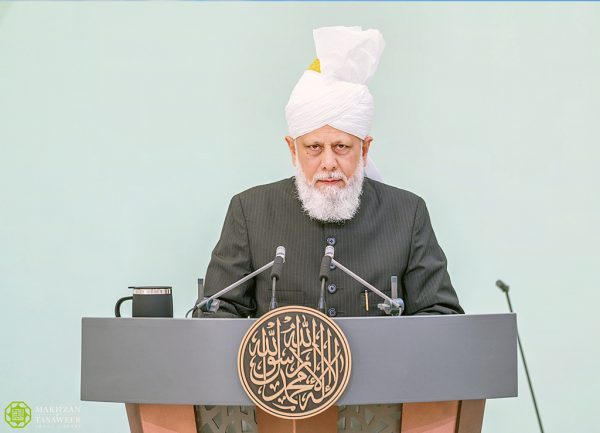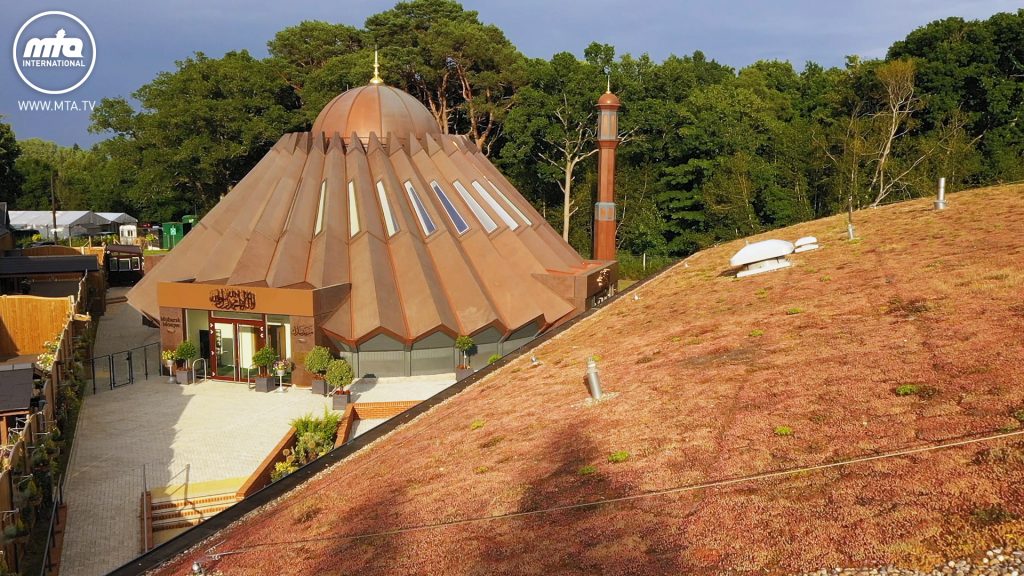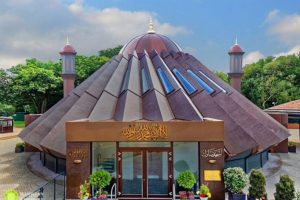After reciting Tashahhud, Ta‘awwuz and Surah al-Fatihah, His Holiness, Hazrat Mirza Masroor Ahmad (aba) said that he would continue mentioning details regarding the Battle of Hunain.

The Angels Descend on the Battlefield
His Holiness (aba) said that God Almighty mentions armies descending from the heavens during the Battle of Hunain, which are likened to angels. God says in the Holy Qur’an:
‘Then Allah sent down His peace upon His Messenger and upon the believers, and He sent down hosts which you did not see, and He punished those who disbelieved. And this is the reward of the disbelievers.’ (The Holy Qur’an, 9:26)
His Holiness (aba) said that commentators believe that this was just a metaphor in order to strengthen the resolve of the soldiers in battle. However, accounts narrated in the Hadith show that angels did indeed practically take part in the battle. The question then arises as to why thousands of angels were sent, as opposed to just one, who would have been enough to help the army.
His Holiness (aba) quoted the Promised Messiah (as), who mentions that thousands of angels being sent was a means of bolstering the resolve of the Muslim army. Hence, five thousand angels have been mentioned as opposed to just one, even though just one angel would have been enough to help the Muslim army prevail.
His Holiness (aba) quoted Hazrat Mirza Bashiruddin Ahmad (ra), who states that the descent of angels was a state of vision that overcame the Muslims in order to support and help them. Otherwise, even without the angels, God had the power to help them; however, this was a means of rendering support to the Muslims.
His Holiness (aba) said that at another instance, Hazrat Mirza Bashiruddin Mahmud Ahmad (ra) states that eternal life is attained by one who is prepared to welcome death for the sake of God. When one stands with this intention, the angels stand to keep that person alive. When a person says that he is prepared to die for God, the angels gather and say that they will not allow him to die, and ultimately, the angels win. During the Battle of Hunain, only 12 companions remained beside the Holy Prophet (sa), yet the Holy Prophet (sa), despite the advice of his companions to the contrary, pressed forward, even in the face of four thousand enemy archers. This was, in reality, God speaking, as right before, the Holy Prophet (sa) said that he was but a man who was commissioned as a prophet. As he was prepared to welcome death for the sake of his Lord, the angels descended in order to help him.
The Enemies Flee from Battle
His Holiness (aba) said that when the Holy Prophet (sa) called out to his companions and they returned to the battlefield and started fighting zealously, the Holy Prophet (sa) also took hold of a handful of dirt and stones and threw them in the direction of the enemies. As a result, just a short while later, despite being one of the most skilled armies of Arabia, the enemy army of the Banu Hawazin started to falter and flee. The Banu Thaqif continued to fight; however, 70 of their men were killed, and finally, when their final flagbearer, Uthman bin Abdillah, was killed, the Banu Thaqif finally fled. Upon hearing the news of this flagbearer’s demise, the Holy Prophet (sa) prayed for mercy to be averted from him for his crimes against the Quraish.
His Holiness (aba) said that four companions were martyred during this battle, namely Aiman bin Ubaid (ra), the son of Umm Aiman (ra) (the same Umm Aiman who helped raise the Holy Prophet (sa)), Suraqah bin Harith (ra), Yazid bin Dhamma (ra), and Abu Amir (ra). It is recorded that during the battle, one companion was struck in the forehead by an arrow, causing blood to flow across his face and chest. The Holy Prophet (sa) himself cleaned the blood from his face with his blessed hands, upon which the blood stopped flowing, and then the Holy Prophet (sa) prayed for him.
His Holiness (aba) said that Hazrat Khalid bin Walid (ra) was injured when the Muslim army initially fled. After the battle, the Holy Prophet (sa) asked to be taken to Khalid bin Walid (ra). Upon reaching him, the Holy Prophet (sa) sat with him, and upon seeing his wounds, the Holy Prophet (sa) applied his blessed saliva to them, upon which the wounds healed.
News of the Victory of the Muslims Reaches Makkah
His Holiness (aba) said that when the Muslims initially fled the battlefield, some of them went to Makkah and informed people that the Muslims had been defeated and that God forbid, the Holy Prophet (sa) had been killed. Upon hearing this, the hypocrites in Makkah became very happy and said that Arabia would now return to the ancient religion of their forefathers. Upon this, the Amir of Makkah, Attab bin Asid addressed the people that even if the Holy Prophet (sa) was indeed martyred, the religion of Allah would always remain established, and the Being Whom the Holy Prophet (sa) worshipped was alive, and would never die. A short while later, news reached Makkah that the Muslims were in fact resoundingly victorious. Similarly, the false news of the Muslim army also initially reached Madinah; however, later, the real news of the Muslim army’s victory was conveyed.
His Holiness (aba) said that it had previously been mentioned that right before the Conquest of Makkah, a companion had killed someone despite their conveying of the Islamic greeting of peace. In this regard, it is mentioned that after the Battle of Hunain, when the Holy Prophet (sa) was setting out for the Expedition of Ta’if, Uyainah asked the Holy Prophet (sa) for recompense for the blood of the man who had been killed. The Holy Prophet (sa) offered him to take blood money, a total of one hundred camels. Initially, Uyainah disagreed as he had come to exact revenge, but ultimately, he agreed to take the blood money. Later, the companion who had killed the man went to the Holy Prophet (sa) and sought forgiveness, but the Holy Prophet (sa) did not pray for his forgiveness. It is recorded in a narration that the Holy Prophet (sa) did later pray for his forgiveness.
The Expedition of Autas
His Holiness (aba) then presented details regarding the Expedition of Autas. After suffering defeat at the Battle of Hunain, the army of the Banu Hawazin fled wherever they could. A part of the army fled to Ta’if, while another part of the army fled to Autas, and another to Nakhlah. Autas was a valley near Hunain. After obtaining the spoils from the Battle of Hunain, which was the largest amount of spoils obtained by the Muslims up until that point, the Holy Prophet (sa) proceeded towards Ta’if, while sending a contingent to Autas under the leadership of Hazrat Abu Amir Ash’ari (ra). Once there, Hazrat Abu Amir (ra) invited the enemy to battle, and a group of ten brothers stepped forward to fight. They were initially invited to Islam, but they chose to fight. Hence, one by one, Hazrat Abu Amir (ra) dropped them to their death one by one. When the tenth brother stepped forward, he made it seem as if he was accepting Islam, causing Hazrat Abu Amir (ra) to put down his sword. Now that he was not on guard to fight, the tenth brother attacked him. It is said that later the tenth brother became a Muslim and a very good one at that. Later, Hazrat Abu Amir (ra) continued fighting and was struck in the knee with an arrow. When the arrow was taken out, he realised that the wound was quite deep and there were slim chances of his survival. He requested Hazrat Abu Musa Ash’ari (ra) to convey his greeting of peace to the Holy Prophet (sa) and to pray for his forgiveness. A few moments later, Hazrat Abu Amer (ra) passed away. Hazrat Abu Musa Ash’ari (ra) led the contingent to their victory, and after obtaining the spoils of war, he returned to the Holy Prophet (sa) and told him everything that had happened and conveyed the message of Hazrat Abu Amir (ra). Upon hearing this, the Holy Prophet (sa) prayed in detail for Hazrat Abu Amer (ra). Hazrat Abu Musa Ash’ari (ra) requested the Holy Prophet (sa) to also pray for his forgiveness, and so the Holy Prophet (sa) prayed for him as well.
The Expedition of Tufail bin Amr Dausi
His Holiness (aba) said that then there was the Expedition of Tufail bin Amr Dausi which took place in Shawwal 8 AH towards Dhu al-Kaffain. When the Holy Prophet (sa) was going towards Ta’if, he sent Tufail Dausi (ra) to destroy the idol of Dhu al-Kaffain. The Holy Prophet (sa) sent him with the advice to spread the greeting of peace everywhere, to feed the hungry, to fear God, and if ever he made a mistake he should make up for it by carrying out an act of virtue. Hence, Tufail Dausi (ra) went and set fire to the idol of Dhu al-Kaffain. Upon completing his mission, Tufail Dausi, along with the four hundred men with him returned to the Holy Prophet (sa) who was now in Ta’if. Tufail Dausi (ra) also brought the Holy Prophet (sa) modern artillery and weaponry that was used for the first time during the battle that would take place in Ta’if.
The Siege of Ta’if
His Holiness (aba) said that the Battle of Ta’if took place in Shawwal 8 AH. The Thaqif tribe resided in Ta’if and its people were proficient in war. There was a strong fortress here. The battle that took place here was essentially an extention of the Battle of Hunain, because the people of Thaqif had fled here after being defeated at the Battle of Hunain. The Holy Prophet (sa) sent Hazrat Khalid bin Walid (ra) ahead to Ta’if with 1,000 Muslim soldiers. They attempted to come to an agreement with the people of Ta’if but to no avail. After sending Khalid bin Walid (ra), the Holy Prophet (sa) also set out towards Ta’if and upon reaching there lay siege to the fortress at Ta’if. The Banu Thaqif had gathered a year’s worth of rations in the fortress. The Muslim army had not yet settled when the people of Ta’if started shooting arrows at the Muslims and wounding some of them. The Holy Prophet (sa) instructed that another suitable spot should be identified where they could set up camp. Subsequently, narrations indicate a series of exchanging arrows and stones between the people of Ta’if and the Muslim army. After some time, as a last resort, the Holy Prophet (sa) instructed that the grape vines of the people of Ta’if should be cut down. Initially, the people of Ta’if said that the Muslims could go ahead and do so; however, when the grape vines started to be set on fire, a chieftain of Ta’if requested the Holy Prophet (sa) to have mercy and not to do so. Hence, the Holy Prophet (sa) accepted this request and instructed the orchards to be left alone.
The Holy Prophet (sa) and the Muslims remained there in Ta’if for a little over half a month. All the while, the people of Ta’if remained within their fortress, as they were afraid on account of what had happened at the Battle of Hunain. Even upon being challenged, the Banu Thaqif would not come out. Yazid bin Dhamma (ra) offered that if he was ensured safety, he would come into the fortress and speak with the people of Ta’if. Initially, they agreed, and so Yazid (ra) approached; however, the people of Ta’if had no intention of granting his safety and martyred him. He was the nephew of Hazrat Umm Salamah (ra). The man who killed him thought that this incident would have struck fear into the Muslims, and so he emerged from the fortress; however, he was captured by Yazid’s (ra) brother and ultimately killed for his crime.
His Holiness (aba) said that he would continue mentioning these incidents in the future.

Funeral Prayers
His Holiness (aba) said that he would offer the funeral prayer in absentia of the following two people:
Dr Syed Shahab Ahmad
Dr Syed Shahab Ahmad who was originally from India and had been residing in Canada. He is survived by a son and three daughters. He was the grandson of Hazrat Syed Iradat Hussain (ra), a companion of the Promised Messiah (as). He obtained his doctorate in psychology from the University of Scotland. Then, upon the instruction of the Third Caliph (rh), he went to Canada and taught clinical psychology. He served the Community both in India and Canada. He served a president in Saskatoon and in other capacities in Edmonton as well. He was active in spreading the message of Islam. He organised various interfaith conferences in Saskatoon and spoke about Islam on various occasions. He was a scholarly person and had various articles published in different publications. He published two books on the history of companions of the Promised Messiah (as) from Bihar as well as martyrs from Bihar. A third book of his in English on the topic of Ahmadiyyat in Bihar has also been completed. He was a righteous elder and an exemplary Ahmadi. He abided by the teachings of Islam and had deep love for the Holy Prophet (sa), the Promised Messiah (as), and the Caliphs. Even in his advanced years, he was regular in attending the mosque and continuing his efforts in preaching the message of Islam Ahmadiyyat. His Holiness (aba) prayed that may Allah grant his forgiveness and mercy.
Mubarak Khokhar
Mubarak Khokhar of Lahore, son of Insha’Allah Khokhar. He had a very close relationship with the Fourth Caliph (rh), both before and during his caliphate. He had a successful business which he started on the advice of the Fourth Caliph (rh). He possessed many virtuous qualities and served the people around him. He is survived by his wife, a daughter and two sons. His Holiness (aba) prayed that may Allah grant him forgiveness and mercy.
Summary prepared by The Review of Religions



Add Comment